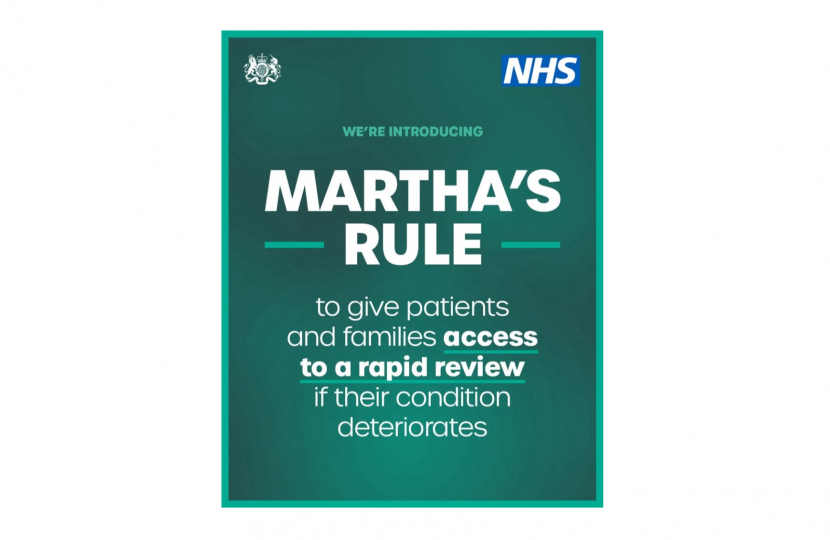
The Government and the NHS have announced Martha’s Rule will be implemented in hospitals across England from April, enabling patients and families to seek an urgent review if their condition deteriorates.
The patient safety initiative is set to be rolled out to at least 100 NHS sites by March 2025 and will give patients and their families round-the-clock access to a rapid review from an independent critical care team if they are worried about their or a loved one’s condition. This escalation process will be available 24 hours a day to patients and families and NHS staff, and will be advertised throughout hospitals, making it quickly and easily accessible.
Richard Fuller MP said:
Martha’s Rule will provide a major boost to patient safety by putting in place a system that can be triggered by patients, or by their family and friends, when they are worried that their condition is worsening. This will give vital reassurance that the best care possible is being given.
The introduction of Martha’s Rule from April will put families at the heart of the patient’s own care, recognising the critical role they have in the treatment of loved ones.
Thirteen-year-old Martha Mills died from sepsis at King’s College Hospital, London, in 2021, due to a failure to escalate her to intensive care and after her family’s concerns about her deteriorating condition were not responded to promptly. Extensive campaigning by her parents, Merope and Paul, supported by the cross-party think tank Demos, has seen widespread support for a single system that allows patients or their families to trigger an urgent clinical review from a different team in the hospital if the patient’s condition is rapidly worsening and they feel they are not getting the care they need.
While some NHS Trusts already offer rapid review processes similar to Martha’s Rule called Call 4 Concern, others do not have an equivalent mechanism in place. In recognition of these variations in readiness, there will be a phased approach to implementing Martha’s Rule.
The first phase will see Martha’s Rule rolled out to at least 100 acute or specialist provider sites in England in 2024/25, supported by up to £10 million. NHS England will lead the process of identifying which acute provider sites will participate in this first phase and supporting the development of their local processes. Alongside this, drawing from the local learning from new and existing schemes, NHS England will develop proposals for national rollout of Martha' Rule in the next Spending Review period.
This national programme will build on NHS England’s Worry and Concern pilots launched at seven trusts last year, which developed and tested escalation methods for patients’ and families’ concerns. As part of Martha’s Rule, health staff at participating hospitals will also formally record daily insights and information about a patient’s health directly from their parents or families making sure any changes in behaviour or condition are noted by the people who know the patient best.
NHS teams will also identify ways to roll out an adapted Martha’s Rule model across other settings, including community and mental health hospitals, where the processes may not apply in the same way.
The introduction of Martha’s Rule comes alongside other measures to improve the identification of deterioration, including the rollout last November of a new early warning system for staff treating children. The Paediatric Early Warning System is built on similar processes already in place for adult, newborn, and maternity services. Here clinicians are able to track potential deterioration by formally recording changes in vital signs like blood pressure, heart rate, oxygen levels and levels of consciousness, with different scores representing the level of concern.
This is all part of wider work to improve how the NHS uses data, better supports staff to manage deterioration, and see greater involvement from patients, families, and carers.
